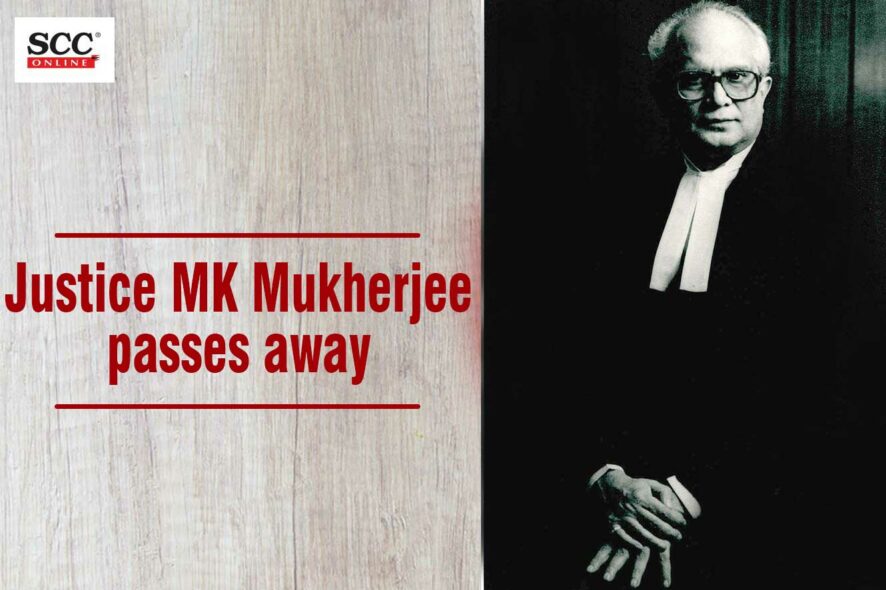As per a Telegraph report, former Supreme Court judge Justice Manoj Kumar Mukherjee has passed away in Calcutta on Saturday. He was 87.
Born on 1.12.1933, Justice Mukherjee joined the Asansol Bar bar in November, 1956 and practiced in the Sub-Divisional and District Court and Labour Tribunal till 1971 before enrolled as an Advocate of the High Court on 14.12.1962. His main areas of practice were Criminal and Industrial Labour matters.
He was then appointed as Additional Judge, Calcutta High Court on 17.6.1977 and was later made permanent Judge of the same High Court on 8.12.1977.
He was elevated to the Supreme Court on 14.12.1993 and after serving for almost 5 years, he retired on 30.11.1998.
♦Did you know? Justice Mukherjee led the Commission of Inquiry for alleged disappearance of Netaji Subhash Chandra Bose. [i]
As judges are remembered for their judgments, here are 5 of his notable judgments as a Supreme Court judge:
Special Reference No. 1 of 1998, Re, (1998) 7 SCC 739
In this landmark ruling, the 9-judge bench held that while the opinion pf the Chief Justice of India has primacy in appointment of judges of the Supreme Court and the High Court, his/her sole opinion is not enough. It was held,
“The expression “consultation with the Chief Justice of India” in Articles 217(1) and 222(1) of the Constitution of India requires consultation with a plurality of Judges in the formation of the opinion of the Chief Justice of India. The sole individual opinion of the Chief Justice of India does not constitute “consultation” within the meaning of the said articles.”
R.K. Sabharwal v. State of Punjab, (1995) 2 SCC 745
When a 5-judge bench was called upon to decide the implementation of the Punjab Government instructions dated 4-5-1974 issued under the Punjab Service of Engineers Class I PWD (IB) Rules, 1964, it held that the reservations provided under the impugned Government instructions are to be operated in accordance with the roster to be maintained in each Department. The roster is implemented in the form of running account from year to year and that the purpose of “running account” is to make sure that the Scheduled Castes/Schedule Tribes and Backward Classes get their percentage of reserved posts.
It was held that once the total cadre has full representation of the Scheduled Castes/Tribes and Backward Classes in accordance with the reservation policy then the vacancies arising thereafter in the cadre are to be filled from amongst the category of persons to whom the respective vacancies belong.
Further, in the event of non-availability of a reserve candidate at the roster point it would be open to the State Government to carry forward the point in a just and fair manner.
University of Delhi v. Anand Vardhan Chandal, (2000) 10 SCC 648
The 5-judge bench held that
While right to education is a fundamental right, the right to contest the students’ union elections is a mere statutory right.
The Court held that since right to participate in elections to the State Assemblies and Parliament is not a fundamental right but only a statutory right, the participation in the students’ union activities including elections cannot be placed on a higher pedestal.
T.N. Seshan, Chief Election Commr. of India v. Union of India, (1995) 4 SCC 611
The 5-judge bench held that while the Cheief Election Commissioner does not enjoy the status superior to that of an Election Commissioner (EC), asthe ECs are not intended to be permanent incumbents, therefore, they could not be conferred the type of irremovability that is bestowed on the CEC.
“In the case of the CEC he can be removed from office in like manner and on the like ground as a Judge of the Supreme Court whereas the ECs can be removed on the recommendation of the CEC. That, however, is not an indicia for conferring a higher status on the CEC. To so hold is to overlook the scheme of Article 324 of the Constitution.”
Hence, it must be remembered that the CEC is intended to be a permanent incumbent and, therefore, in order to preserve and safeguard his independence, he had to be treated differently.
State of T.N. v. Arooran Sugars Ltd., (1997) 1 SCC 326
The 5-judge bench held that the power of the legislature to amend, delete or obliterate a statute or to enact a statute prospectively or retrospectively cannot be questioned and challenged unless the court is of the view that such exercise is in violation of Article 14 of the Constitution.
“It need not be impressed that whenever any Act or amendment is brought in force retrospectively or any provision of the Act is deleted retrospectively, in this process rights of some are bound to be affected one way or the other. In every case, it cannot be urged that the exercise by the legislature while introducing a new provision or deleting an existing provision with retrospective effect per se shall be violative of Article 14 of the Constitution.”
†Associate Editor, EBC Publishing Pvt. Ltd.
[i] https://www.mha.gov.in/sites/default/files/jmci-I-eng.pdf







can i get the land mark judgements of justice Justice Mukherjee …pl
9440683736